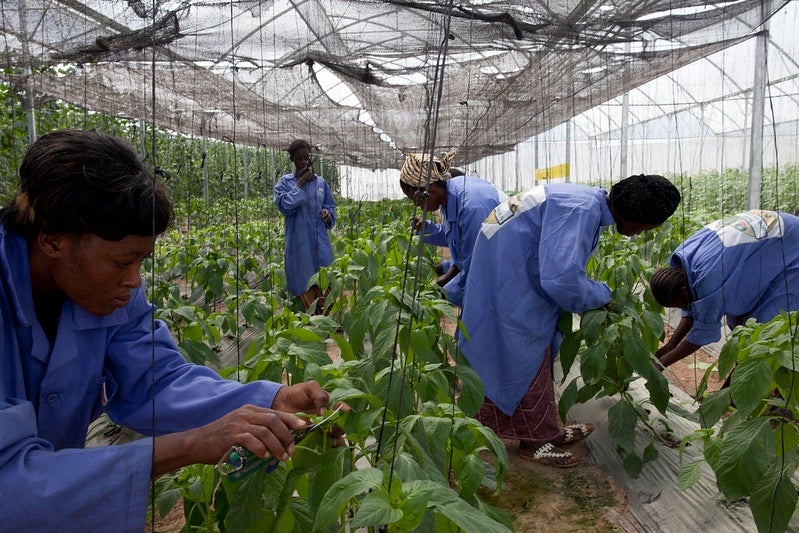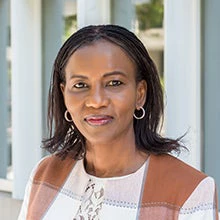 Workers carefully clip plants in the greenhouse of Sidibe Argo-Techniques in Katibougou Village, outside Bamako, Mali
Workers carefully clip plants in the greenhouse of Sidibe Argo-Techniques in Katibougou Village, outside Bamako, Mali
In an era of overlapping crises, fragility, conflict and violence remain among the greatest global challenges to poverty reduction and sustainable development. Without tackling the root causes and underlying drivers, conflicts can often recur. The United Nations, World Bank, and our public, private sector, and civil society partners make the greatest contribution when we collaborate to support national stakeholders in finding long-term, sustainable pathways to peace and development.
The latest UN-World Bank Joint Monitoring Report, which builds on our 2017 Framework for Partnership in Crisis-Affected Settings, shows the richness of UN-WB partnerships in these contexts - and our capacity to adapt and innovate in the face of global challenges.
Since 2016, the UN system has implemented over $5.6 billion of IDA funds (World Bank’s fund for the poorest countries) in more than 50 countries affected by fragility and conflict, substantially extending the Bank’s ability to stay engaged in conflict contexts and helping to tackle shared priorities in areas like food security, forced displacement and the COVID-19 response.
Here are some ways the World Bank and UN are leveraging our respective mandates and strengths:
Building a shared understanding of local dynamics in fragile contexts: Impactful programming starts with sound analysis. Since the last report in 2021, the UN and the WB have collaborated on many data and analytic products and together with other partners, undertaken a major joint assessment of prevention and resilience needs in Northern Mozambique at the Government’s request. The Bank benefits from the UN’s comparative advantage in supporting governments in, for example, political processes, governance, security and justice sectors, and engagement with civil society; while the Bank’s expertise is invaluable to the UN, including in peace processes, e.g., in Libya and Yemen.
Joining forces with humanitarian and development agencies to help countries in – and beyond - crisis: Partnerships between the World Bank and UN Agencies including UNDP, UNICEF, UNOPS and WFP have enabled continued delivery for vulnerable people in Afghanistan, Sudan and Yemen, and helped to preserve development gains under the most difficult circumstances. Elsewhere, partnerships begun in times of crisis have evolved to seize new opportunities -- for example, in South Sudan and Somalia, emergency delivery of IDA through UN partners has given way to hybrid systems supporting nationally-owned plans. In the Sahel, where climate and fragility crises compound each other, the World Bank, WFP and UNICEF aligned efforts to support adaptive social protection systems that cover large parts of the population.
A shared goal to ensure food security: UN Agencies and WB collaborate on food security in more than 20 countries, ranging from Afghanistan and Burkina Faso, to Yemen, with work centering around food assistance, increased food production, improved storage, data collection, and early warning. WB’s collaboration with the UN on food and nutrition security led to the establishment of the Global Alliance for Food Security (GAFS), announced at the G7 in May 2022, a platform to promote coordinated global action to address food crisis.
Using comparative strengths to address forced displacement: With 108 million people forcibly displaced worldwide, refugees and host communities need integrated, sustainable support. The United Nations High Commissioner for Refugees (UNHCR) has collaborated with the WB through their Joint Data Center on Forced Displacement, and on improving refugee policies through consultative reviews of refugee policy frameworks in 16 countries. Building on the policy and data collaboration, the WB has allocated $3.6 billion in additional resources dedicated to refugees and host communities since July 2020.
There is much more we can do together. One area in which we need to invest more is prevention and resilience, including supporting governments to address drivers of fragility and anticipating challenges earlier and better. In his 2023 policy brief, “A New Agenda for Peace,” UN Secretary-General Antonio Guterres has called for the prevention of conflict and violence to be treated as a universal challenge and a national obligation of all countries, urging UN Member States to consider investing in national prevention plans. Recognizing the need for coordinated, sustained support to such plans, the UN and WB have moved to align our instruments and capacities. In settings like Burundi, Chad and DRC, the UN Secretary-General’s Peacebuilding Fund and the FCV Envelope set up under the Bank’s IDA funding provide complementary support against national milestones.
Six years ago, the joint UN-World Bank study “Pathways for Peace” set out the business case for inclusive development to address grievances around unequal development, lack of transparency and inequitable management of natural resources. Last year, we jointly held consultations that reinforced the study’s relevance today.
But implementation must now be accelerated as well as tailored to specific contexts, adjusting to meet new challenges. In a fragmented and volatile world, our peace and development tools must be more adaptive; do more to address the intersection of conflict and climate risk; privilege the voices of local partners, especially women and young people; and better track and report on our impact.



Join the Conversation